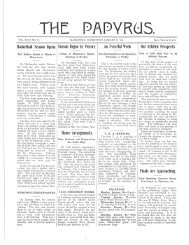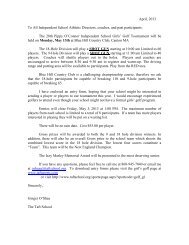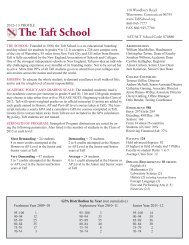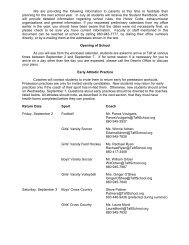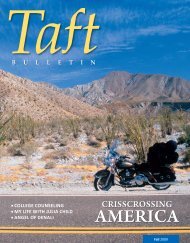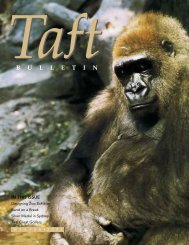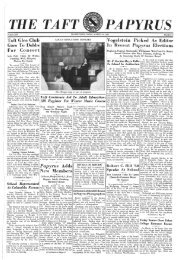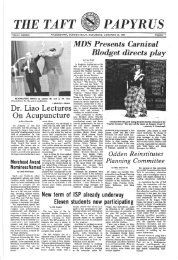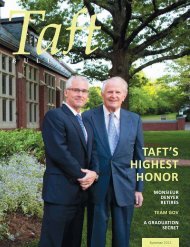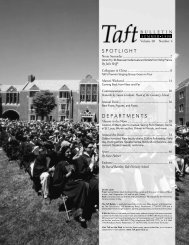B U L L E T I N Taft Portrait of a Graduate - The Taft School
B U L L E T I N Taft Portrait of a Graduate - The Taft School
B U L L E T I N Taft Portrait of a Graduate - The Taft School
- No tags were found...
Create successful ePaper yourself
Turn your PDF publications into a flip-book with our unique Google optimized e-Paper software.
“Over the 45 years <strong>of</strong> actively managing<br />
the land my thoughts have been<br />
stewardship, conservation, preservation and<br />
perpetuation. Our goal is to leave the land<br />
better than when we started,” he affirms.<br />
“Both what is best for the land and the economics<br />
<strong>of</strong> operating a pr<strong>of</strong>itable dairy farm<br />
have been foremost in my planning.”<br />
John was honored this year for his<br />
skills and accomplishments as a farmer<br />
when he was inducted into the Master<br />
Farmers Association, an esteemed association<br />
<strong>of</strong> approximately 450 farmers<br />
(developed over 70 years) that inducts only<br />
four to six farmers annually from the<br />
Middle Atlantic states. It is apparent that<br />
John has both the willingness and sense<br />
<strong>of</strong> duty to serve far beyond his own farm<br />
in this country and others, exemplifying<br />
<strong>Taft</strong>’s motto. To learn more about John<br />
Rodgers’ Plum Bottom Farm, see its Web<br />
site at www.plumbottomfarm.com.<br />
Award to Romano<br />
<strong>The</strong> Council for Advancement<br />
and Support <strong>of</strong> Education (CASE)<br />
presented former Director <strong>of</strong> Development<br />
Jerry Romano with the<br />
prestigious Eleanor Collier Award<br />
this spring. <strong>The</strong> 2003 Achievement<br />
and Awards Ceremony was held in<br />
New York City at Tavern on the<br />
Green before 500 education pr<strong>of</strong>essionals<br />
from CASE Districts I and II.<br />
Jerry was recognized for his extraordinary<br />
17 years <strong>of</strong> service to and<br />
performance at <strong>Taft</strong>. Under his leadership,<br />
Annual Fund giving doubled<br />
and the Parents’ Fund, the most successful<br />
in the country, boasted a<br />
participation rate <strong>of</strong> 95 percent. He<br />
directed the Campaign for <strong>Taft</strong> from<br />
1994–99, raising $133 million, far<br />
exceeding the original goal <strong>of</strong> $75<br />
million. He was honored for his devotion<br />
to the school, his leadership<br />
<strong>of</strong> staff and volunteers, and his tireless<br />
efforts to make <strong>Taft</strong> one <strong>of</strong> the<br />
finest secondary schools in the nation.<br />
Emily McNair ’99 (far right) at a Kathmandu Tibetan refugee center, visited by her<br />
sister Annie ’02 (hidden from view at left) and brother Roody ’04 who took this photo.<br />
Studying Beekeeping<br />
Emily McNair ’99 will soon be studying<br />
beekeeping around the world. As<br />
one <strong>of</strong> 60 U.S. college graduates who<br />
have been awarded a Thomas J.<br />
Watson Fellowship, she will study the<br />
ecological, historical, economic, and<br />
social aspects <strong>of</strong> beekeeping, visiting<br />
Malta, Slovakia, Tunisia, Argentina,<br />
New Zealand, and Vietnam. Emily<br />
graduated from Bard College this year<br />
majoring in anthropology, with a concentration<br />
in environmental studies.<br />
<strong>The</strong> idea for this project came<br />
about when Emily was living in Nepal<br />
(her third trip there), doing research<br />
on development issues. Emily has a<br />
long-standing interest in environmental<br />
justice, land reform, and land rights<br />
and as a result, she met with squatter<br />
camps <strong>of</strong> Kamaiya, emancipated<br />
bonded workers living in the Bardiya<br />
district, who are struggling for land<br />
reform. Much <strong>of</strong> this region is now a<br />
national park where locals have been<br />
excluded from land ownership and use<br />
<strong>of</strong> the land and its resources. And because<br />
Maoist rebel fighting has been<br />
going on in that area, all international<br />
NGOs have left leaving locals who<br />
have been dependent on them for employment<br />
desperate for work. Emily<br />
says that the Kamaiya are now interested<br />
in sustainable agriculture ideas,<br />
more in line with their agrarian roots.<br />
Her interest in Nepal began while she<br />
was a student at <strong>Taft</strong>, participating in<br />
a program <strong>of</strong> ecological work there.<br />
A friend invited Emily to visit a<br />
Nepali friend who is director <strong>of</strong> the<br />
Lalitpur Beekeeping Concern in the<br />
Kathmandu Valley. “It hit me,” Emily<br />
says, “Beekeeping—the perfect project<br />
for the Kamaiya community.” At the<br />
Lalitpur beekeeping project, she<br />
learned what was needed to make a<br />
collective work and have high yield<br />
honey production. In Bardiya, the<br />
clearing <strong>of</strong> jungle land for rice paddies<br />
has significantly reduced the bee<br />
population so apiaries will need to<br />
be constructed, ideally, out <strong>of</strong> local<br />
materials and using local bees for honey<br />
production.<br />
Because the Watson fellowship<br />
requires that a recipient visit countries<br />
where one has not already spent<br />
significant time, Emily will not be<br />
spending her project time in Nepal.<br />
She’ll learn how beekeeping is done in<br />
a number <strong>of</strong> countries, and how it can<br />
be applied with simple technology elsewhere<br />
as a viable project for fostering<br />
sustainable agriculture for agrarian<br />
communities such as those in Nepal.<br />
<strong>Taft</strong> Bulletin Summer 2003<br />
9



